2020中考复习 八种时态练习题 六种基本句型翻译训练
八种时态练习题--+--六种基本句型翻译训练

二. 用所给词的适当形式填空:1. He__________swimming in the river every day in summer. (go)2. It________you are right. ( seem )3. Look, the children______________ basketball on the playground. ( play )4. He________________to the radio when I came in, ( listen )5. It is very cold .I think it_____________ . ( rain )6. ---I need some paper.---I_____________ some for you. ( bring )7. I can’t find my pen. Who_____________it? (take )8. He said that he________________back in five minutes . ( come )9. I didn’t meet him. He_____________ when I got there. ( leave )10. I______________my bike, so I have to walk to school. ( lose )11. He____________down and began to read his newspaper. ( sit )12.He is very hungry. He_______________ anything for three days. ( not eat )13.I____________with you if I have time . ( go )14.We will go to the cinema if it____________fine . (be )15.I will tell her the news when she_____________to see me next week. (come)16. ---When__________you_________the car? ---In 1998. (buy )17. We_____________ good friends since we met at school . (be)18. What______you______ at five yesterday afternoon ? (do)19. The bike is nice . How much______it______? (cost)20. The boy is happy because he ___________(sell) out all the newspapers.21.The plan ________________(give) up because of rain.22.If it __________(not rain) tomorrow, we ____________(go )fishing.23.Where ____________you____________(be) these days? 24.Where is Tom? He _________(go) to the post office. He said he _________(come) back soon.25.Mike says he _________(want )to be a worker after he _________ (finish )school.26.The last bus _______just ________(leave) when they ________(get) to the bus stop.27.She _________(not go) to bed until she _______(finish) her work.28.Light ___________(travel )much faster than sound.29.I __________(feel) much better after I _______(take) the medicine. 30.“ Where ________we________(meet)?”“Let’s meet outsidethe park gate.”31.I_________(be) afraid Mr. Johnson __________(not visit) our school tomorrow.32.I _________(lost) my bike ._________you _________(see) it anywhere?33.________this kind of car __________(produce) in Shanghai? 34.We __________(see) several members of the family since we ________(arrive)35.I found that the students _________(play) football on the playground.36.The shop ___________(close) at this time of day.37. ——They say there’s a new restaurant nearby.——Yes, and it _________________ (be)open for no more than a week.38.________the doctor __________(send) for last night?39.Jim with his parents __________(visit) the Great Wall the day after tomorrow.40.Some children ________________(take ) good care by the nurse. 41.Some new houses _____________(build) by the villagers themselves.42.What language _____________(speak) in Australia?43.The colour TV _____________(buy) in that shop three days ago. 44.He said he __________(stay) here for another two days. 45.The doctor said Jim must ________(operate ) on at once.46. “__________the bridge _______ (repair) yet? “Yes, theworkers______ already______ (repair) it.”47.We are in Grade One this year, so we ________________(teach ) physics next year.48.“Where _________(be) you last night?”“I_________(ask) to help Tom at home”49.The big tree ________(blow)down in the storm last night.50.I________ never ________(eat) such delicious noodles before. 51.When we reached the town, it _______(get) dark.52.We ________(have) lunch when suddenly someone knocked at the door.53.Lucy said she ________(visit) the school the next month.54.I ________(wait) until he comes back.55.You ________(watch) TV after supper, aren’t you?56.They _________(be) to that small village several times.57.Can you tell me if it _________(snow) tomorrow?58.Could you tell me if you _________(read) the story book? 59.He said the lights in the room _________(go) out when he opened the door.60. I _________(be) fifteen soon.61.Tom, your aunt _______(come) this afternoon .62.My teacher often _________(tell) us not to play on the street. 63.They________(plant) trees on the hill. Do you see?64.The teacher said that the earth ________(move) round the sun. 65.She said she _______(put) on a new coat the next day.66.The Great Wall _________(know) all over the world.67.Could you tell me where Alice ________ (live)?68.________the film ______(show) many times since last Sunday. 69.________the street lights usually _______(turn) on at seven in summer evening?70.I _______(not go) to the cinema because I ________(see) the film before.71.It ________(get) dark. What about ________(go) home at once? 72.You ________(be) late if you __________(not hurry).73.Use your head and you _________(find) a better way. 74.Look!Someone ________(lie) on the floor.75.It __________(rain) harder now. It ________(rain) quite often in summer.76.Here _______(come) the bus.77.I don’t know when the manager ________(return), but when be _________(come) back, I _________(let) you know. 78.“Where ________(be) you this time yesterday?”“I________(be) at home. I _______(go) over my lessons then.”79. ___________Tom often __________ (play) chess after school?80. David _____________ (wash) his face and_______ (brush) his teeth every morning.81. What time _________We _________ (leave) tomorrow?82. If you__________ (not hurry), you__________(be)late for the meeting.83. My mother ____________(not do) housework yesterday.84. ________ your father __________ (go) to work every day last year?三. 用英语翻译下列句子:85. 我走近花园时,几个男孩子在爬树。
初中英语八大时态练习题
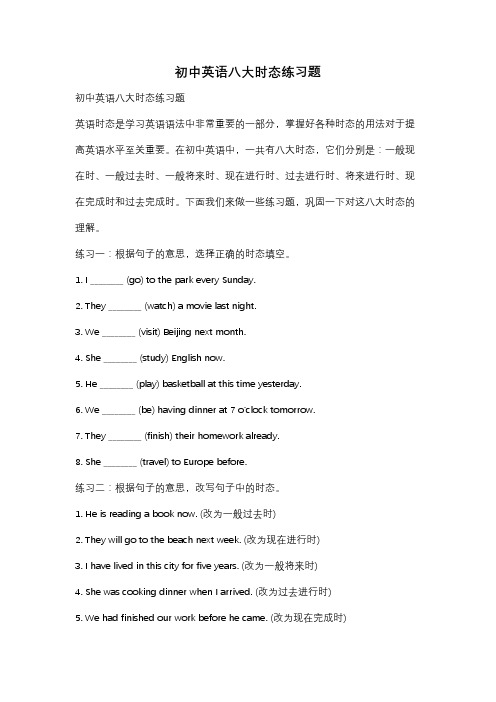
初中英语八大时态练习题初中英语八大时态练习题英语时态是学习英语语法中非常重要的一部分,掌握好各种时态的用法对于提高英语水平至关重要。
在初中英语中,一共有八大时态,它们分别是:一般现在时、一般过去时、一般将来时、现在进行时、过去进行时、将来进行时、现在完成时和过去完成时。
下面我们来做一些练习题,巩固一下对这八大时态的理解。
练习一:根据句子的意思,选择正确的时态填空。
1. I ________ (go) to the park every Sunday.2. They ________ (watch) a movie last night.3. We ________ (visit) Beijing next month.4. She ________ (study) English now.5. He ________ (play) basketball at this time yesterday.6. We ________ (be) having dinner at 7 o'clock tomorrow.7. They ________ (finish) their homework already.8. She ________ (travel) to Europe before.练习二:根据句子的意思,改写句子中的时态。
1. He is reading a book now. (改为一般过去时)2. They will go to the beach next week. (改为现在进行时)3. I have lived in this city for five years. (改为一般将来时)4. She was cooking dinner when I arrived. (改为过去进行时)5. We had finished our work before he came. (改为现在完成时)6. They have been studying English since morning. (改为过去完成时)7. He is going to the concert tomorrow. (改为将来进行时)8. I played soccer with my friends yesterday. (改为一般现在时)练习三:根据句子的意思,用正确的时态填空。
中考英语-八大时态的基本时态练习(含答案)
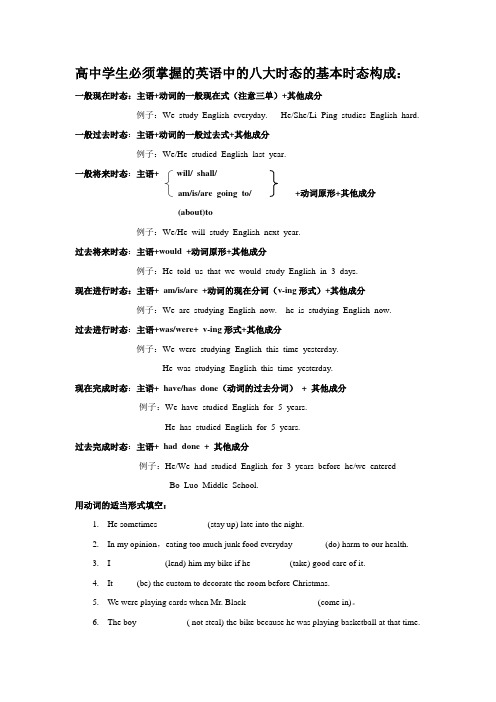
高中学生必须掌握的英语中的八大时态的基本时态构成:一般现在时态:主语+动词的一般现在式(注意三单)+其他成分例子:We study English everyday. He/She/Li Ping studies English hard. 一般过去时态:主语+动词的一般过去式+其他成分例子:We/He studied English last year.一般将来时态:主语+ will/ shall/am/is/are going to/ +动词原形+其他成分(about)to例子:We/He will study English next year.过去将来时态:主语+would +动词原形+其他成分例子:He told us that we would study English in 3 days.现在进行时态:主语+ am/is/are +动词的现在分词(v-ing形式)+其他成分例子:We are studying English now. he is studying English now.过去进行时态:主语+was/were+ v-ing形式+其他成分例子:We were studying English this time yesterday.He was studying English this time yesterday.现在完成时态:主语+ have/has done(动词的过去分词)+ 其他成分例子:We have studied English for 5 years.He has studied English for 5 years.过去完成时态:主语+ had done + 其他成分例子:He/We had studied English for 3 years before he/we enteredBo Luo Middle School.用动词的适当形式填空:1.He sometimes ___________(stay up) late into the night.2.In my opinion,eating too much junk food everyday _______(do) harm to our health.3.I ____________(lend) him my bike if he_________(take) good care of it.4.It _____(be) the custom to decorate the room before Christmas.5.We were playing cards when Mr. Black ________________(come in)。
初中英语八大时态讲解及练习全

初中英语八大时态讲解及练习全LELE was finally revised on the morning of December 16, 2020一、一般现在时:概念:经常、反复发生的动作或行为及现在的某种状况。
时间状语:always, usually, often, sometimes, every week (day, year, month…), once a week, on Sundays, etc.基本结构:①be动词;②行为动词否定形式:①am/is/are+not;②此时态的谓语动词若为行为动词,则在其前加don't,如主语为第三人称单数,则用doesn't,同时还原行为动词。
一般疑问句:①把be动词放于句首;②用助动词do提问,如主语为第三人称单数,则用does,同时,还原行为动词。
在中,当主语是时,谓语动词要用形式,即常在后加-s或-es。
一、he, she, it是第三人称单数。
如:He likes watching TV. 他喜欢看电视。
She has lunch at twelve. 她十二点吃午餐。
It looks like a cat. 它看起来像只猫。
(口诀:I用am,you用are,is用于它,单数名词用is,都用are)二、单个人名、地名或称呼作主语;是第三人称单数。
如:①Han Mei looks like her mother. 看起来像她的母亲。
②Beijing is in China. 北京在中国。
③Uncle Wang often makes cakes. 王叔叔经常做蛋糕。
三、单数可数名词或"this / that / the+单数可数名词"作主语时,是第三人称单数。
如:①A horse is a useful animal. 马是有用的动物。
②This book is yours. 这本书是你的。
四、someone, somebody, nobody, everything, something等及指示代词this, that作主语时,是第三人称单数。
八大时态综合讲解及专项练习题共八页打印版

e.g We clean the room every day.
2.一般过去时:主语+did
e.g We cleaned the room just now.
3.现在进行时:主语+am/is/are doing
e.g We are cleaning the room now.
3.基本结构:be动词;行为动词
4.否定形式:was/were+not;在行为动词前加didn't,同时还原行为动词。
5.一般疑问句:was或were放于句首;用助动词do的过去式did提问,同时还原行为动词。
6.例句:She often came to help us in those days.
A. went swimming B. go swimming C. visited grandparents
一般过去时
一.用“am , is , was”填空
1. I _____ a teacher now. I _____ a student five years ago.
2. Where ______ it now?
6.例句:It seldom snows here.
He is always ready to help others.
Action speaks louder than words.
二、一般过去时:
1.概念:过去某个时间里发生的动作或状态;过去习惯性、经常性的动作、行为。
2.时间状语:ago, yesterday, the day before yesterday, last week(year, night, month…), in 1989, just now, at the age of 5, one day, long long ago, once upon a time, etc.
初中英语八大时态练习试题及答案(详解)

初中英语八大时态练习试题及答案(详解)1一般现在时的用法1) 表示经常性或习惯性的动作,常与表示频度的时间状语连用。
例: every…, sometimes,ofen,always,usually, twice a week, at…, on Sunday等。
I leave home for school at 7 every morning.He watches Tv once a week .2) 表示普遍真理,客观存在,科学事实。
The earth moves around the sun.Shanghai lies in the east ofChina.3) 格言或警句。
Pride goes before a fall. 骄者必败。
注意:此用法如果出现在宾语从句中,即使主句是过去时,从句谓语也要用一般现在时。
例:Columbus proved that the earth is round..4) 表示现在时刻的状态、能力、个性或爱好。
I don't want so much.Ann Wang writes good English but does not speak well.比较:Now I put the sugar in the cup.I am doing my homework now.第一句用一般现在时,用于操作演示或指导说明的示范性动作,表示言行的瞬间动作。
再如:Now watch me, I switch on the current and stand back.第二句中的now是进行时的标志,表示正在进行的动作的客观状况,所以后句用一般现在时。
2一般过去时的用法1)在确定的过去时间里所发生的动作或存在的状态。
时间状语有:yesterday, an hour ago, the other day, in 1982,yesterday morning (afternoon, evening…),last night (week, month, year…), a moment ago , a week ago, three years ago…just now,等。
中考英语时态翻译练习

中考英语时态翻译练习### 中考英语时态翻译练习一、一般现在时1. 我每天早晨读英语。
2. 他们经常在周末去图书馆。
3. 地球绕着太阳转。
二、一般过去时1. 昨天我去了书店。
2. 去年夏天我们去了海边。
3. 他昨天没有完成作业。
三、一般将来时1. 明天我将去看电影。
2. 明年我打算去英国留学。
3. 下周我们将有一个英语考试。
四、现在进行时1. 他正在读一本书。
2. 我们正在学习英语。
3. 现在外面正在下雨。
五、过去进行时1. 昨天晚上我正在看电视。
2. 当我到达时,他们正在吃饭。
3. 昨天下午我正在图书馆学习。
六、现在完成时1. 我已经完成了作业。
2. 他们已经去过中国。
3. 他刚刚完成了他的报告。
七、过去完成时1. 我到达时,电影已经结束了。
2. 他来之前,我已经做了大部分工作。
3. 到去年为止,他已经学了五年英语。
八、将来完成时1. 到明天这个时候,我将已经完成了我的项目。
2. 明年这个时候,我们将已经完成了所有的课程。
3. 到年底,我们将会已经实现了我们的目标。
九、现在完成进行时1. 他一直在学习英语,已经学了三年了。
2. 我们一直在努力工作,已经取得了一些进展。
3. 她一直在等待消息,已经等了几个小时了。
十、过去完成进行时1. 他一直在学习,直到考试结束。
2. 他们一直在工作,直到项目完成。
3. 我一直在读书,直到我累了。
练习答案一、一般现在时1. I read English every morning.2. They often go to the library on weekends.3. The Earth revolves around the Sun.二、一般过去时1. I went to the bookstore yesterday.2. We went to the seaside last summer.3. He didn't finish his homework yesterday.三、一般将来时1. I am going to watch a movie tomorrow.2. I plan to study in the UK next year.3. We will have an English exam next week.四、现在进行时1. He is reading a book.2. We are studying English.3. It is raining outside now.五、过去进行时1. I was watching TV last night.2. They were having dinner when I arrived.3. I was studying in the library yesterday afternoon.六、现在完成时1. I have finished my homework.2. They have been to China.3. He has just finished his report.七、过去完成时1. The movie had ended by the time I arrived.2. I had done most of the work before he came.3. He had been learning English for five years by last year.八、将来完成时1. By this time tomorrow, I will have finished my project.2. By this time next year, we will have completed all our courses.3. By the end of the year, we will have achieved our goals.九、现在完成进行时1. He has been learning English for three years.2. We have been working hard and have made some progress.3. She has been waiting for the news for several hours.十、过去完成进行时1. He had been studying until the exam was over.2. They had been working until the project was completed.3. I had been reading until I was tired.。
初中英语语法八大时态总结及练习题
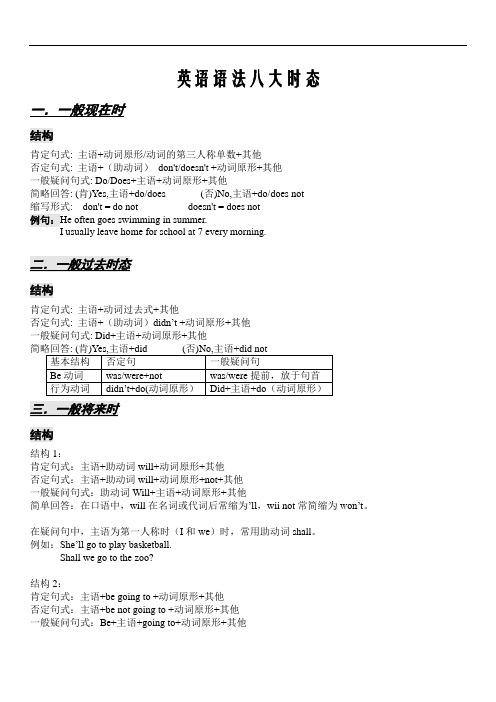
英语语法八大时态一.一般现在时结构肯定句式: 主语+动词原形/动词的第三人称单数+其他否定句式: 主语+(助动词)don't/doesn't +动词原形+其他一般疑问句式: Do/Does+主语+动词原形+其他简略回答: (肯)Yes,主语+do/does (否)No,主语+do/does not缩写形式: don't = do not doesn't = does not例句:He often goes swimming in summer.I usually leave home for school at 7 every morning.二.一般过去时态结构肯定句式: 主语+动词过去式+其他否定句式: 主语+(助动词)didn’t +动词原形+其他一般疑问句式: Did+主语+动词原形+其他基本结构否定句一般疑问句Be动词was/were+not was/were提前,放于句首行为动词didn’t+do(动词原形)Did+主语+do(动词原形)三.一般将来时结构结构1:肯定句式:主语+助动词will+动词原形+其他否定句式:主语+助动词will+动词原形+not+其他一般疑问句式:助动词Will+主语+动词原形+其他简单回答:在口语中,will在名词或代词后常缩为’ll,wii not常简缩为won’t。
在疑问句中,主语为第一人称时(I和we)时,常用助动词shall。
例如:She’ll go to play basketball.Shall we go to the zoo?结构2:肯定句式:主语+be going to +动词原形+其他否定句式:主语+be not going to +动词原形+其他一般疑问句式:Be+主语+going to+动词原形+其他简略回答:(肯)Yes,主语+be (否)No,主语+be not将来时其他表示法1)be going to表示将来表示说话人的打算、计划、安排或根据迹象判断必然或很可能发生的事情。
中考英语八大时态测试题(含答案)
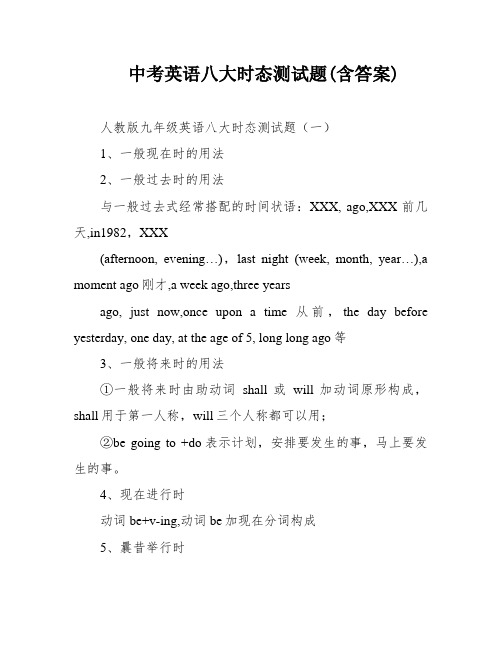
中考英语八大时态测试题(含答案)人教版九年级英语八大时态测试题(一)1、一般现在时的用法2、一般过去时的用法与一般过去式经常搭配的时间状语:XXX, ago,XXX前几天,in1982,XXX(afternoon, evening…),last night (week, month, year…),a moment ago刚才,a week ago,three yearsago, just now,once upon a time从前,the day before yesterday, one day, at the age of 5, long long ago等3、一般将来时的用法①一般将来时由助动词shall或will加动词原形构成,shall用于第一人称,will三个人称都可以用;②be going to +do表示计划,安排要发生的事,马上要发生的事。
4、现在进行时动词be+v-ing,动词be加现在分词构成5、曩昔举行时与过去进行时搭配的时间状语:(just)then那时,当时;XXX在这/那时XXX今世界战书;at nine在九点;last night昨晚;(at)this time XXX在今天这个时分但在很多情形下,没有透露表现工夫的状语,这时候需求经由过程高低文来透露表现。
6、过去将来时构成:一般过去将来时由should或would加动词原形构成,第一人称用should,其他人称用would,第一人称也能够用would.容身于曩昔某一时辰,从曩昔看将要产生的工作,经常使用于宾语从句中。
与曩昔未来时搭配的时间状语:the next day(morning, year…), the following month(week…)等7、现在完成时组成:目前完成时态是由“助动词have(has)+曩昔分词”组成,标记词:for, since, since…ago,yet8、过去完成时实战模仿()1. There _______ XXX.A. XXX()2. --- Who sings best in your class?--- Jenny _______.1XXX done()3. --- _____ the young girl _____ the old man clean his room every day?--- Yes, she does.A. Does; XXX; XXX; helpD. Do; helps()4. --- Can I go to Beijing for my holiday, Dad?--- You can when you _______ a bit older.A. will XXX()5. --- What does Linda often do in the evening?--- She often ____ her homework, but on the evening of March 12 she____TV.A. does; watchesB. is doing; watchedC. does; watchedD. is doing; was watching()6. XXX __around the sun.A. XXX()7. If he _______harder, he will catch up with us soon.A. XXX()8. --- Don’t forget to ask him to write to me.--- I won’t. As soon as he _____, I’ll ask him to write to you.A. XXX coming()9. --- Do you like this silk dress?--- Yes, I do. It _______ so soft and comfortable.A. is XXX felt()10. Oh, it’s you. I’m sorry I _______ know you _______ here.A. don’t; areB. didn’t; XXX’t; XXX’t; were() 11. XXX?2A. XXX() XXX XXX.A. XXX() 13. Some arein the XXX.A. swiming, playingB. swimming, plaiingC. swimming, playingD. swimming, plaing() 14.---Where is Dick?--- Heto the reading-room.A. has XXX() 15. Mark Twain, an American writer,XXX.A. knowsB. is known asC. is known toD. is known for () 16. I hope he will come to see me before XXX.A. XXX left() XXX.A. XXX() 18. I think sheright now.A. XXX readingD. read() 19. ---- Where are the children?---- Theya good time in the garden.A. XXX() 20. ----- Wheremy glasses? I can’t find them.---- Ithem on the bookshelf, XXX.A. you put, putB. you have put, have putC. have you put, putD. did you put, have put3() 21. When the police arrived, the manfor 10 minutes. A. diedB. was deathC. had diedD. had been dead() 22. By the time this talk is over, wea lot about the earth.A. will be XXX have learnt()23. XXX difficulties.A. helpedB. will helpC. helpD. were going to help() 24. ----Have you seen him today? ----Yes, Ihim this morning.A. has XXX() 25. Heworried when he heard this news.A. XXX() 26. XXX.A. XXX do()27. I don’t think that it’s true. He’XXX.A. XXX() 28. Have XXX Farm?A. XXX() 29. XXX?A. has, borrowedB. has, keptC. has, lentD. is, using() 30. Heto do this lessons at eight every evening.A. XXX() 31. XXX.A. are going to hasB. is going to haveC. are havingD. are going to have() XXX.A. XXX4() 33.heon well with his friends this term?A. Does, getsB. Does, getC. Is, gettingD. Is, geting() XXX? I can’t find it.A. XXX() XXX Saturday?A. XXX play() 36. The childrenat school now.A. XXX()XXX stories, but hea TV play these days.A. is writing, is writingB. is writing, writesC. writes, is writingD. writes, writes() 38. He said hethe league(联盟) for two years.A. has joinedB. has been inC. had been inD. joined() 39. XXX garden,she?A. XXX’t() 40. Whatyouto do to keep the room clean?A. do, haveB. does, haveC. did, haveD. are, have() 41. Some flowersby XXX already.A. have been XXX()42. When winter comes, XXX.A. are going toB. willC. will beD. would() 43. Ito the XXX.A. go, goB. am going, goC. go, am goingD. am going, am going() XXX future now,you?A. don’t think, XXX, aren’t5XXX, doD. aren’t thinking, are()45. XXX hehis way.A. would lostB. would loseC. is going toD. shall lose() 46. Weeach other since he left here.A. XXX’t XXX seen() 47. Mr. Smithout for a walk in the park every day.A. XXX go() 48. Hefrom home for a long time.A. has gone awayB. had gone awayC. has leftD. has been away()49. You mustn’t go too high, or youdangerous.A. will beB. areC. would beD. is going to() 50. We have known each other.A. since we were youngB. after we were youngC. when we are youngD. if we are young() 51. XXX work.A. XXX. is going to() 52. How long has this shop?A. be XXX() 53. Mr. Smithhere since he moved to his city.A. had XXX has lived()54. ----Have you read the newspaper?----No, I XXX’t.A. XXX()55. Our knowledge of the universeall the time. 6A. XXX() 56. She won’t go to the XXX.A. XXX()57. XXX.A. has been deadB. was deadC. has diedD. died() 58. Sheto the Great Wall several times.A. goesB. has goneC. wentD. has been() 59. XXX.A. XXX() 60. XXX book.A. XXX()61. Ithe bike for over four years.A. XXX()62. XXX.A. had visitedB. has visitedC. will visitD. would visit() 63. His motherthe Party last year. Shea Party member for a year.A. joined, wasB. has joined, isC. joined, has beenD. has joined, has been() 64. We don’t know if itthe day after tomorrow.A. XXX rain() 65. He said hehis life for his country.A. XXX givenD. would give()66. XXX.A. goB. goesC. wentD. is going() 67. Look, the XXX.7A. XXX() 68. Hein this school in 1958.A. XXX() XXX.A. will XXX() 70. XXX work in two days.A. had XXX finish()71. By the end of last week, XXX.A. would learnB. have learnedC. had learnedD. were learning () 72. When he left, his mother.A. XXX() 73. We’ll go to play with snow if XXX.A. XXX() XXX.A. XXX() 75. The trainwhen we got to the XXX.A. has just leftB. had just leftC. leavesD. left() 76. Dr Smith is not at home. Heto work.A. has goneB. has beenC. had beenD. had gone() 77. That man knows a lot about New York. I heard hebefore.A. had gone to the cityB. had been in thereC. had been thereD. had been New York() 78. The artistto Europe. He is there now.A. has goneB. has beenC. had goneD. had been8() 79. Miss Brown said XXX China before.A. has, goneB. has, beenC. had, goneD. had, been() XXX?A. is, doingB. was, doingC. did, doD. had, done() 81. Ito see the film because I have XXX.A. XXX’t gone() 82. The students will have a football match if XXX.A. will beB. would beC. wasD. is() 83. She asked me if Ithe story before.A. have readB. had readC. would readD. will read() XXX?A. are, doingB. did, doC. have, doneD. were, doing() 85. You can’t see him now because XXX.A. XXX having() XXX.A. XXX’t XXX() 87. Li Ping will visit the Great Wall as soon as hefree.A. will beB. isC. wasD. has been() 88. One day when Ithe post office Imy uncle.A. pass, seeB. was passing, sawC. passed, sawD. pass, saw () XXX.A. said, will makeB. said, madeC. said, had madeD. said, make() XXX.9A. are, haveB. were, haveC. were, to haveD. are, having () XXX.A. XXX. take a walkD. is taking a walk() 92. Mary is seven years old. Sheeight next year.A. XXX be() 93. A table and many XXX.A. wasB. wereC. are beingD. was being() 94. I’ll go with you as soon as Imy work.A. will XXX() 95. Treesgreen in spring.A. XXX XXX() 96. XXX Iin bed all day because I had a fever.A. XXX() 97. Hello, Mike. It’s you. Iyouin Beijing. How long have you been here?A. don’t know, XXX’t know, areC. XXX, areD. XXX’t know, were() 98. A: Whenagain? B: When he. I’ll let you know.A. he comes, comesB. will be come, will comeC. he comes, will comeD. will he come, comes() 99. The last bus. I had to walk home.A. had goneB. have goneC. wentD. has gone() 100. A: Are you making cakes?B:.A. Yes, I doB. Yes, I amC. Yes, I’mD. Yes, I’m making10()101. ----What time?----My watch.A. it is, stoppedB. is it, has stoppedC. it is, has stoppedD. is it, is stopping() 102. Whaton Sunday?A. does he sometimes doB. is he often doingC. has he doneD. is usually he do()XXX night?A. XXX, XXX, watchingC. XXX, XXX, XXX() 104. That Japanese knowsthe Salt Lake City. I XXX.A. a lot of, had been thereB. a lot about, had been thereC. lot, had been thereD. a lot of, had gone there() 105. As soon as we saw his face, XXX.A. XXX, wasB. know, wereC. know, wasD. know, were11参考答案1-10:DCABCDBCBC11-20:ABCCCBBCAC21-30:DDDDBDBDBD31-40:DCBCABCBAA。
2020年中考英语专题复习:常见时态与练习题(含答案)

2020年中考英语专题复习:常见时态与练习题一、学习目标1. 熟练掌握本册书将要学习的一般现在时和现在进行时的相关构成和基本用法。
2. 理解一般过去时,一般将来时,现在完成时,过去进行时,过去完成时的用法。
3. 通过时态的学习增强学生信心,树立“英语中没有什么克服不了的困难”这个理念。
二、重点、难点时态的概念以及各种时态的构成,并理解时态记忆法的规律。
三、考情分析1. 熟练掌握动词的几种基本形式:原形,三单,现在式,现在分词,过去式和过去分词。
熟练掌握一般现在时、一般过去时、一般将来时、现在完成时、现在进行时、过去进行时的构成和基本用法,理解过去将来时、过去完成时的构成和基本用法,掌握一般现在时、一般过去时、一般将来时和带有can, may, must等情态动词的被动语态的构成和基本用法。
2. 本讲内容可谓遍布试卷的每一个部分。
知识梳理动作的时间和状态时态现在进行过去一般将来完成一般现在时【用法】1. 基本用法:(1)表示经常性或习惯性的动作。
He often goes to school on foot.(2)表示客观真理时,永远用一般现在时。
The moon is smaller than the earth.(3)在时间、条件状语从句中,主句用一般将来时,从句用一般现在时,即主将从现。
常见的标志词有:if和as soon as【例句】If it doesn’t rain tomorrow, we’ll go for a picnic.I will tell her the message as soon as I see her.2. 句式结构:含有be动词的表示状态:主语+ be动词+ 表语含有实义动词的表示动作:主语+ 实义动词3. 一般现在时态的标志词:every day / week / month / year之类的短语或always,often,sometimes,usually,seldom等表示频率的词。
八大时态练习题
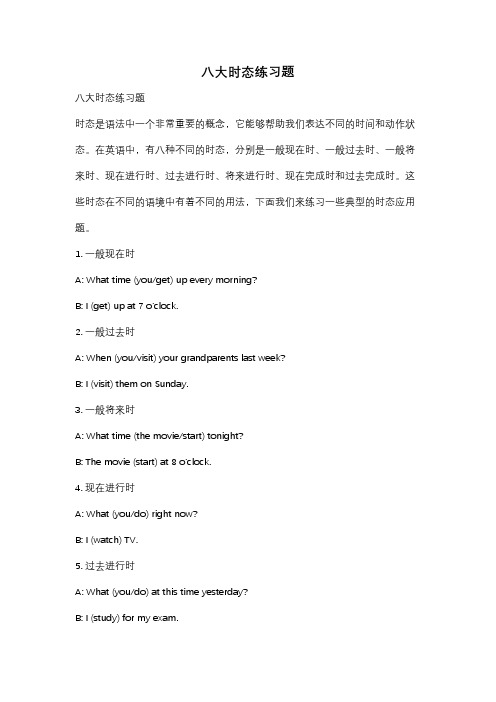
八大时态练习题八大时态练习题时态是语法中一个非常重要的概念,它能够帮助我们表达不同的时间和动作状态。
在英语中,有八种不同的时态,分别是一般现在时、一般过去时、一般将来时、现在进行时、过去进行时、将来进行时、现在完成时和过去完成时。
这些时态在不同的语境中有着不同的用法,下面我们来练习一些典型的时态应用题。
1. 一般现在时A: What time (you/get) up every morning?B: I (get) up at 7 o'clock.2. 一般过去时A: When (you/visit) your grandparents last week?B: I (visit) them on Sunday.3. 一般将来时A: What time (the movie/start) tonight?B: The movie (start) at 8 o'clock.4. 现在进行时A: What (you/do) right now?B: I (watch) TV.5. 过去进行时A: What (you/do) at this time yesterday?B: I (study) for my exam.6. 将来进行时A: What (you/do) this time tomorrow?B: I (work) on a project.7. 现在完成时A: How many books (you/read) so far this year?B: I (read) ten books.8. 过去完成时A: By the time I arrived, they (already/leave).B: Oh no, I (miss) them.这些练习题涵盖了八种不同的时态,让我们更好地理解和掌握它们的用法。
一般现在时用于描述经常性的动作或事实,一般过去时用于过去发生的动作或事情,一般将来时用于表示将来的动作或计划,现在进行时用于描述正在进行的动作,过去进行时用于过去某个时间正在进行的动作,将来进行时用于描述将来某个时间正在进行的动作,现在完成时用于描述过去发生的动作对现在造成的影响,过去完成时用于描述过去某个时间之前已经完成的动作。
(完整版)初中英语8种时态分类练习及答案

初中英语8种时态分类练习1.一般过去2.一般现在。
现在进行4一般将来5过去进行6现在完成7过去完成8过去将来一般过去时专练( )1. The mother asked the boy _______ down the ladder, but he went on _______ instead.A. come; climbingB. to come; to climbC. to come; climbingD. coming; climbing( )2. The teacher asked the students to close the windows _______ the wind from _______ the papers away.A. to stop; blowingB. stopping; blowingC. to stop; blowD. stopped; blow( )3. The sick man stayed in bed, _______ very terrible.A. feltB. feelingC. is feelingD. was feeling( )4. Yesterday I heard a story _______ by my friend.A. toldB. tellingC. to tellD. tell( )5. The boy was made _______ there for an hour by his father.A. standingB. standC. to standD. stands( )6. I saw him _______ into the small store.A. wentB. goingC. to goD. has gone( )7. He raised his voice to make everybody in the room ______ him clearly.A. hearB. to hearC. hearingD. heard( )8. Our geography teacher told us yesterday that the earth _______ around the sun.A. was movingB. movedC. has movedD. moves( )9. Oh, it’s you. I’m sorry I _______ know you _______ here.A. don’t; areB. didn’t; areC. didn’t; wereD. don’t; were( )10. Mr LuXun died in 1936. He _______ a lot of famous novels.A. wroteB. was writingC. has writtenD. would write( )11. --- How was your weekend on the farm?--- Great! We _______ with the farmers.A. enjoy ourselvesB. went fishingC. will workD. make friends( )12. --- What did Mr Jones do before he moved here?--- He _______ a city bus for over twenty-five years.A. is drivingB. droveC. has drivenD. drives( )13. Jane _______ a new dress every month when she was in Shanghai.A. buysB. is buyingC. boughtD. will buy( )14. --- Liu Mei can’t come tonight.--- Why? But she _______ me she would come.A. tellsB. toldC. is toldD. had told( )15. He turned off the light and then _______.A. leavesB. has leftC. will leaveD. left一般过去时专练1-5 CABAC 6-10 BADCA 11-15 BBCBD一般现在时与现在进行时专练( ) 1. Father usually ______ his newspaper after dinner.A. readB. readsC. readingD. is reading( ) 2. The Blacks often ______ to the cinema on Saturday evenings.A. goB. goesC. is goingD. are going( ) 3.Look! The boy ______ with his mother in the pool.A. is swimmingB. is swimmingC. are swimmingD. are swiming( ) 4.--- What is Tom doing in the classroom? --- He ______ something on the blackboard.A. drawsB. drawC. is drawingD. are drawing.( ) 5.Old Tom usually ______ up at six and ______ sports in the garden.A. gets, dosB. gets, doesC. get, doesD. gets, do( ) 6. It’s ten o’clock and Jack ______ still(仍然) ______ his homework.A. is, doB. is, doingC. are, doD. are, doing( ) 7. The waiters ______ to work at five every morning.A. startB. startsC. startingD. are starting( ) 8.I ______ a letter, so I can’t go out with you.A. is writingB. am writingC. am writeingD. am writting( )9.A hundred days _____ quite a long time.A. isB. areC. haveD. has( )10. --______ late for the meeting next time. –Sorry, I won’t.A. Don’tB. Don’t beC. Won’t beD. Be not( )11. My mother _____ noodles, but my father ______.A. likes, doesn’tB. don’t like, doC. likes, didn’tD. didn’t like, do( )12. The picture ______ nice.A. looksB. is lookedC. lookD. is looking( )13. The students will go to the Summer Palace if it ______ tomorrow.A. don’t rainB. doesn’t rainC. won’t rainD. isn’t rain( )14. We are always ready _______ others.A. to helpingB. to helpC. helpD. helping( )15. I often hear her ______ about the boy.A. talkingB. talkC. to talkD. talked( )16. He’s already a little weak in Chinese, ______ he ?A. isB. isn’tC. hasD. hasn’t( )17.Potatoes are ______ in the field by the farmers.A. growB. growingC. grownD. grew( )18. Does she have a watch? – Yes, she ______.A. haveB. doC. hasD. does( )19. She _____ English very much now.A. is likingB. likesC. likedD. is teaching( )20. She has no paper to _____ . Why not give her some?A. writeB. be writingC. write onD. write in()21. Does Mr Know-all know ______ keys?A. to makeB. how to makeC. how makeD. making( )22. Does your mother ______ English now?A. teachesB. teachC. taughtD. is teaching( )23. Jack usually ______ mistakes last term. But this term he does better.A. makesB. madeC. doesD. did( )24. The boy is too young, please ______ carefully.A. look after himB. look him afterC. look at himD. look him at( )25. She ______ you to come to my birthday party.A. hopesB. wishesC. wantD. lets( )26. --Where is Frank now? -- He ______ his bike in the yard.A. fixes upB. fixing upC. is fixing upD. fixed( )27. Bob often ______ his mother with the housework on Sundays.A. helpB. helpingC. helpsD. helped( )28. The students will go to the Summer Palace if it ______ tomorrow.A. don’t rainB. doesn’t rainC. won’t rainD. isn’t rain( )29. If it _____ tomorrow, I will go by car.A. rainB. will rainC. rainsD. would rain( )30. --What a nice garden! –She ______ it every day.A. is cleaningB. has cleanedC. cleansD. clean( )31. --Where is Peter? -- He ______ his homework in the room.A. is doingB. doesC. didD. do( )32. The teacher told us that light ______ much faster than sound.A. travelsB. traveledC. wasD. will be( )33. My mother told us that Taiwan ______ part of China.A. isB. areC. wasD. were( )34. Do you know bananas _____ in Hainan?A. growsB. is grownC. grewD. are grown( )35. The clothes ______very soft.A. are feltB. are feelingC. feelD. feels( )36. The supermarket is far from Mary’s house. So she _____ only once a week.A. goes shoppingB. has been thereC. was shoppingD. has gone there ( )37. Don’t make so much noise. We _____ to the music.A. are listeningB. listenC. listenedD. have listened( )38. I’ll go swimming with you if I _____ free tomorrow.A. will beB. shall beC. amD. was( )39. – Oh, Mrs. King, your sweater looks nice. Is it _____ wool ?-- Yes, and it’s _____ Inner Mongolia.A. made of, made byB. made of, made inC. made by, made forD. made by, made from一般现在时与现在进行时专练1-5BAACB 6-10BABAB 11-15AABBB 16-20 BCDBC21-25 BBBAC 26-30 CCBAC 31-35 AAABC 36-39 AACB3.一般将来时专练( )1. Her hope _______ the 2008 Olympic Games.A. to take part inB. is to take part inC. taking part inD. will take part in ( )2. --- Can I go to Beijing for my holiday, Dad? --- You can when you _______ a bit older.A. will getB. getC. are gettingD. got( )3. If he _______harder, he will catch up with us soon.A. studyB. studiesC. will studyD. studied( )4. --- Don’t forget to ask him to write to me.--- I won’t. As soon as he _______, I’ll ask him to write to you.A. will comeB. cameC. comesD. is coming( )5. --- Jimmy is leaving for a holiday.--- Really? Where _______ he _______?A. has; goneB. will; goC. did; goD. would; go( )6. Frank _______ to see his grandma if he _______ free tomorrow.A. will come; will beB. comes; isC. will come; isD. comes; will be( )7. There _______ a talk on science in our school next Monday.A. will giveB. will beC. is going to giveD. is( )8. --- Shall we go shopping now?--- Sorry, I can’t. I _______ my shirts.A. washB. washesC. washedD. am washing( )9. I believe that those mountains _______ with trees in a few years’ time.A. are coveredB. will be coveredC. are coveringD. will cover( )10. It is said that about 400 cars _______ in the factory next month.A. were producedB. will produceC. are producedD. will be produced( )11. --- Are you free this afternoon?--- No. I’ll have an English composition _______ this afternoon.A. to writeB. wroteC. to be writingD. to be written( )12. --- Come back home every month.--- I _______.A. willB. mustC. shouldD. can( )13. A robot _______ think of itself; it _______ be told what to do.A. can’t; mustB. couldn’t; canC. may not; willD. mustn’t, may一般将来时专练1-5 BBBCB 6-10 CBDBD 11-13 AAA4.过去进行时专练二、用动词的适当形式填空。
初中英语:语法八种时态详解及练习
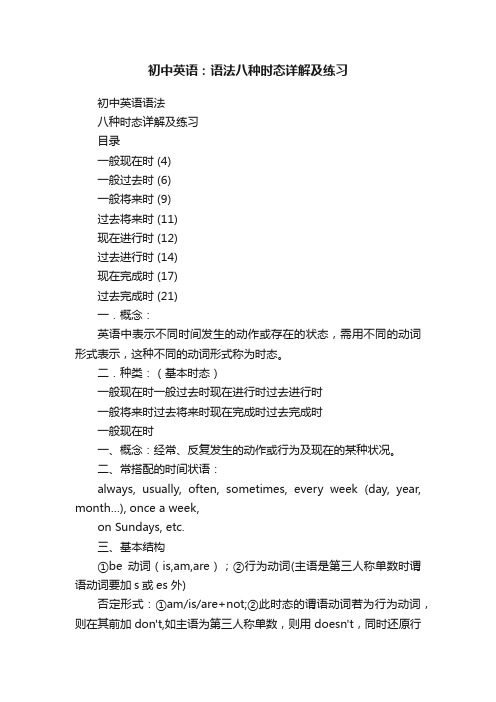
初中英语:语法八种时态详解及练习初中英语语法八种时态详解及练习目录一般现在时 (4)一般过去时 (6)一般将来时 (9)过去将来时 (11)现在进行时 (12)过去进行时 (14)现在完成时 (17)过去完成时 (21)一.概念:英语中表示不同时间发生的动作或存在的状态,需用不同的动词形式表示,这种不同的动词形式称为时态。
二.种类:(基本时态)一般现在时一般过去时现在进行时过去进行时一般将来时过去将来时现在完成时过去完成时一般现在时一、概念:经常、反复发生的动作或行为及现在的某种状况。
二、常搭配的时间状语:always, usually, often, sometimes, every week (day, year, month…), once a week,on Sundays, etc.三、基本结构①be动词(is,am,are);②行为动词(主语是第三人称单数时谓语动词要加s或es 外)否定形式:①am/is/are+not;②此时态的谓语动词若为行为动词,则在其前加don't,如主语为第三人称单数,则用doesn't,同时还原行为动词。
一般疑问句:①把be动词放于句首;②用助动词do提问,如主语为第三人称单数,则用does,同时,还原行为动词。
例句:I go to school at 6 every morning. 每天早上我七点去上学。
Summer follows spring. 春天之后是夏天。
I learned that the earth goes around the sun when I was in primary school. 我在小学就学过地球是围绕太阳转的。
Pride goes before a fall. 骄者必败。
四、基本用法:1) 描述当前时间内经常出现、反复发生的动作或存在的状态。
在这种情景中,句子常带有表示频率的时间状语:always , everyday , often , once a week (month , year , etc.) , sometimes , seldom , usually等等,以表示句中的动作或状态是习惯性的、经常性的。
初中英语八大时态练习(免费)
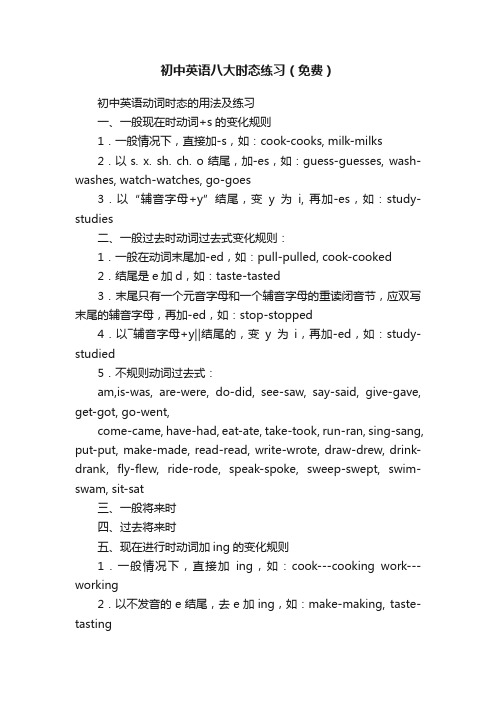
初中英语八大时态练习(免费)初中英语动词时态的用法及练习一、一般现在时动词+s的变化规则1.一般情况下,直接加-s,如:cook-cooks, milk-milks2.以s. x. sh. ch. o结尾,加-es,如:guess-guesses, wash-washes, watch-watches, go-goes3.以“辅音字母+y”结尾,变y为i, 再加-es,如:study-studies二、一般过去时动词过去式变化规则:1.一般在动词末尾加-ed,如:pull-pulled, cook-cooked2.结尾是e加d,如:taste-tasted3.末尾只有一个元音字母和一个辅音字母的重读闭音节,应双写末尾的辅音字母,再加-ed,如:stop-stopped4.以―辅音字母+y‖结尾的,变y为i,再加-ed,如:study-studied5.不规则动词过去式:am,is-was, are-were, do-did, see-saw, say-said, give-gave, get-got, go-went,come-came, have-had, eat-ate, take-took, run-ran, sing-sang, put-put, make-made, read-read, write-wrote, draw-drew, drink-drank, fly-flew, ride-rode, speak-spoke, sweep-swept, swim-swam, sit-sat三、一般将来时四、过去将来时五、现在进行时动词加ing的变化规则1.一般情况下,直接加ing,如:cook---cooking work---working2.以不发音的e结尾,去e加ing,如:make-making, taste-tasting3.如果末尾是一个元音字母和一个辅音字母,双写末尾的辅音字母,再加ing,如:run-running, stop-stopping六、过去进行时:七、现在完成时八、过去完成时一、写出下列动词的第三人称单数drink________go____________stay____________make__________loo k________ ____have____________pass__________ carry _________come___________ watch___________ plant_____________ fly ___________study___________ brush____________二、写出下列动词的过去式及过去分词is,am_________ fly_______ plant________ are ________drink_________play_______ go________ make ________ does_________ dance________worry________ ask _____taste_________ eat__________ draw________ put______ throw________ kick_________ pass_______ do ________三、写出下列动词的现在分词:play________run__________swim_________make__________go_____ ____like________write________ski___________read__________have_________sing ______dance_________put_________see________begin________shop________ ___ buy________ love____________ live_______ take_________ come ________ get_________stop_________ sit ________四、用括号内动词的适当形式填空。
初中六种基本时态汉译英翻译练习(XXX原创)
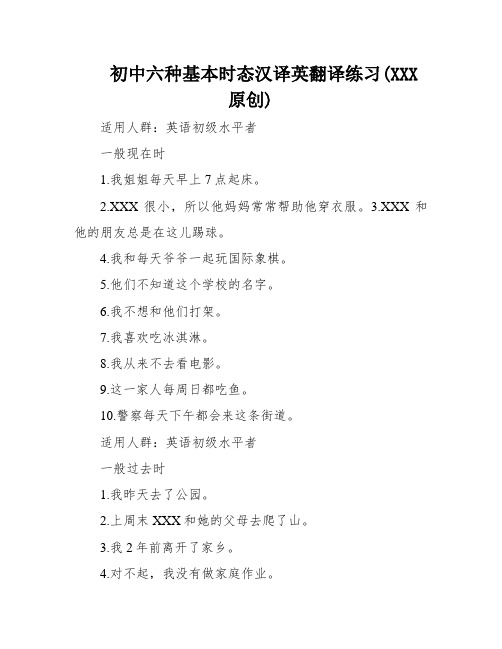
初中六种基本时态汉译英翻译练习(XXX原创)适用人群:英语初级水平者一般现在时1.我姐姐每天早上7点起床。
2.XXX很小,所以他妈妈常常帮助他穿衣服。
3.XXX和他的朋友总是在这儿踢球。
4.我和每天爷爷一起玩国际象棋。
5.他们不知道这个学校的名字。
6.我不想和他们打架。
7.我喜欢吃冰淇淋。
8.我从来不去看电影。
9.这一家人每周日都吃鱼。
10.警察每天下午都会来这条街道。
适用人群:英语初级水平者一般过去时1.我昨天去了公园。
2.上周末XXX和她的父母去爬了山。
3.我2年前离开了家乡。
4.对不起,我没有做家庭作业。
5.他和他爸爸上周末玩了一整天篮球。
6.去年这个房子是XXX家的,但是他们把它卖给了一个上海人。
7.我认为你昨天做了一件正确的事。
8.他的校服脏了,所以他今天没穿。
9.去年夏天,他们的数学老师结婚了。
10.XXX的弟弟弄坏了这个书桌的一条腿。
适用人群:英语初级水平者一般未来时1.我们下周就要放假了。
2.他的手机马上就要坏了。
3.我待会就给我妈妈发一条短信。
4.这个班级本周六将举办一个足球比赛。
5.不要做梦了。
那些人永远也不会帮助你的。
6.我下周六要和我妈妈去购物。
我们要买衣服和XXX.他们不会把自己的好机会给你的。
你应该寻找别的办法。
8.十天之后我们的店就要关闭了。
欢迎你们来买便宜的鞋和包。
9.你永远也不会知道这个秘密的。
10.谁将会成为中国?适用人群:英语初级水平者目前举行时1.听!鸟儿正在唱歌。
2.爷爷奶奶正在公园里散步。
3.你可以去和他交谈了,他正在那边吃午饭。
4.黄金的价格正在升高。
你应该快点去买一些。
5.我们正在一天天长大,XXX正在一天天变老。
6.XXX早退了。
目前,他正在路上奔驰。
7.谁正在教室里唱歌?8.他是不是正在学日语?9.这电影太差了,没人在认真看。
10.所有的老师都正在开会呢。
适用人群:英语初级水平者曩昔举行时1.我昨天下午2点正在家做作业。
2.他们去年这个时候正在故乡卖生果。
2020中考英语八大时态讲解及习题

中考英语八大时态讲解及习题Ⅰ. 初中英语八种时态归纳复习1.一般现在时2.一般过去时3.现在进行时4.过去进行时5.现在完成时6.过去完成时7.一般将来时8.过去将来时一、一般现在时:概念:经常、反复发生的动作或行为及现在的某种状况。
时间状语:always, usually, often, sometimes, every week (day, year, month…), once a week, on Sundays, etc.基本结构:①be动词;②行为动词否定形式:①am/is/are+not;②此时态的谓语动词若为行为动词,则在其前加don't,如主语为第三人称单数,则用doesn't,同时还原行为动词。
一般疑问句:①把be动词放于句首;②用助动词do提问,如主语为第三人称单数,则用does,同时,还原行为动词。
二、一般过去时:概念:过去某个时间里发生的动作或状态;过去习惯性、经常性的动作、行为。
时间状语:ago, yesterday, the day before yesterday, last week(year, night, month…), in 1989, just now, at the age of 5, one day, long long ago, once upon a time, etc.基本结构:①be动词;②行为动词否定形式:①was/were+not;②在行为动词前加didn't,同时还原行为动词。
一般疑问句:①was或were放于句首;②用助动词do的过去式did 提问,同时还原行为动词。
三、现在进行时:概念:表示现阶段或说话时正在进行的动作及行为。
时间状语:now, at this time, these days, etc.基本结构:am/is/are+doing否定形式:am/is/are+not+doing.一般疑问句:把be动词放于句首。
2020中考初中八大时态讲解和练习
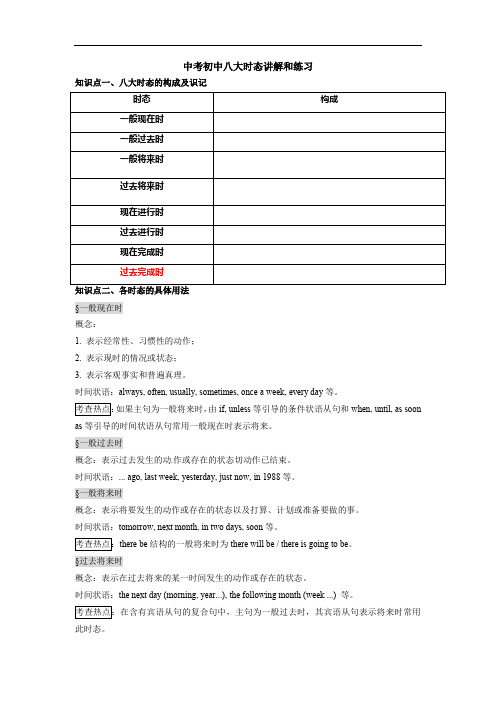
中考初中八大时态讲解和练习知识点一、八大时态的构成及识记§一般现在时概念:1. 表示经常性、习惯性的动作;2. 表示现时的情况或状态;3. 表示客观事实和普遍真理。
时间状语:always, often, usually, sometimes, once a week, every day等。
如果主句为一般将来时,由if, unless等引导的条件状语从句和when, until, as soon as等引导的时间状语从句常用一般现在时表示将来。
§一般过去时概念:表示过去发生的动作或存在的状态切动作已结束。
时间状语:... ago, last week, yesterday, just now, in 1988等。
§一般将来时概念:表示将要发生的动作或存在的状态以及打算、计划或准备要做的事。
时间状语:tomorrow, next month, in two days, soon等。
there be结构的一般将来时为there will be / there is going to be。
§过去将来时概念:表示在过去将来的某一时间发生的动作或存在的状态。
时间状语:the next day (morning, year...), the following month (week ...) 等。
此时态。
§现在进行时概念:表示现在或现阶段正在发生的动作。
时间状语及提示语:now, these days, at this moment, Listen! Look! 等。
§过去进行时概念:表示过去某一时刻或某一时间段内正在进行的动作。
时间状语:at that time, this time yesterday, at six yesterday, when + 从句(动词为过去式)等。
§现在完成时概念:1. 表示过去发生或已经完成的动作对现在造成的影响或结果;2. 表示从过去某时开始一直延续到现在的动作或状态。
初中英语语法-八种时态详解与练习
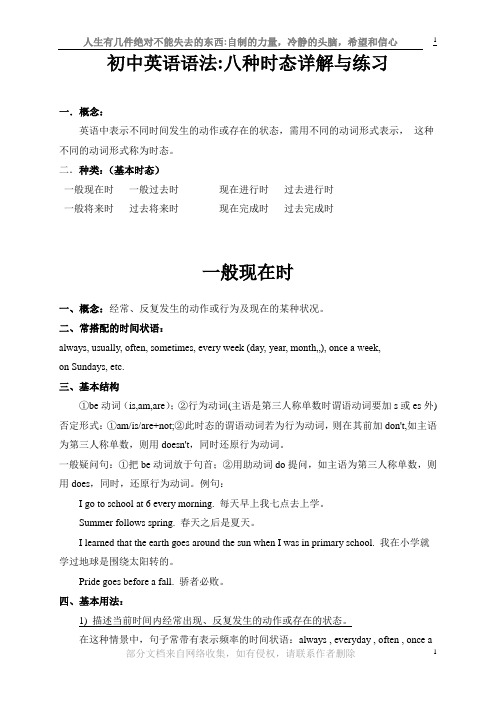
初中英语语法:八种时态详解与练习一.概念:英语中表示不同时间发生的动作或存在的状态,需用不同的动词形式表示,这种不同的动词形式称为时态。
二.种类:(基本时态)一般现在时一般过去时现在进行时过去进行时一般将来时过去将来时现在完成时过去完成时一般现在时一、概念:经常、反复发生的动作或行为及现在的某种状况。
二、常搭配的时间状语:always, usually, often, sometimes, every week (day, year, month…), once a week,on Sundays, etc.三、基本结构①be动词(is,am,are);②行为动词(主语是第三人称单数时谓语动词要加s或es外) 否定形式:①am/is/are+not;②此时态的谓语动词若为行为动词,则在其前加don't,如主语为第三人称单数,则用doesn't,同时还原行为动词。
一般疑问句:①把be动词放于句首;②用助动词do提问,如主语为第三人称单数,则用does,同时,还原行为动词。
例句:I go to school at 6 every morning. 每天早上我七点去上学。
Summer follows spring. 春天之后是夏天。
I learned that the earth goes around the sun when I was in primary school. 我在小学就学过地球是围绕太阳转的。
Pride goes before a fall. 骄者必败。
四、基本用法:1) 描述当前时间内经常出现、反复发生的动作或存在的状态。
在这种情景中,句子常带有表示频率的时间状语:always , everyday , often , once aweek (month , year , etc.) , sometimes , seldom , usually等等,以表示句中的动作或状态是习惯性的、经常性的。
- 1、下载文档前请自行甄别文档内容的完整性,平台不提供额外的编辑、内容补充、找答案等附加服务。
- 2、"仅部分预览"的文档,不可在线预览部分如存在完整性等问题,可反馈申请退款(可完整预览的文档不适用该条件!)。
- 3、如文档侵犯您的权益,请联系客服反馈,我们会尽快为您处理(人工客服工作时间:9:00-18:30)。
八种时态练习题 + 六种基本句型翻译训练一、辨形练习1. Time flies.2. Class begins!3. The man doesn’t smoke.4. We all laughed.5. Everybody has arrived.6. I am crying.7. The sun rises.8. Does it hurt?9. The book sells well.(sell等词用主动形式表示被动意义)以上9个例句均属于句型结构。
1. This is an English-Chinese dictionary.2. The book is interesting.3. The dinner smells delicious.4. Everything looks different.5. His face turned red.6. He feel happy.7. The weather becomes warmer.8. I’m happy to meet you.9. They are willing to help.以上9个例句均属于句型结构。
1. Who knows the answer?2. She laughed at him.3. He understands English.4. Tom made cakes.5. They ate some apples.6. Danny likes donuts.7. I want to have a cup of tea.8. The teacher said “Good morning.”以上8个例句均属于句型结构。
1. Lily passed her sister a new dress.2. He cooked her a delicious meal.3. She bought her husband a new watch.4. He brought you a dictionary.5. I told her nothing.6. I gave him my pictures.7. I gave him a hand.8. He showed me how to run the machine.9. John sent Mary some flowers.以上9个例句均属于句型结构。
1. We saw him go out.2. I saw them getting on the bus.3. They call him Bob.4. They found the house dirty.5. What makes him sad?6. We keep the table clean.7. They painted the door green.8. He asked me to come back soon.以上8个例句均属于句型结构。
1. They work hard. 句型2. The flower is dead. 句型3. Plants need water. 句型4. He gives me some seeds. 句型5. We should keep the plants in the shade. 句型6. Many animals live in trees. 句型二、翻译练习1. 我会试一下的。
2. 昨晚睡得好吗?3. 引擎坏了。
4. 这窗户关不上。
5 这笔写起来很流畅。
6. 你认识这些人吗?7. 我不会用英语表达自己。
8. 我们支付不起这样的价钱。
9. 介意等几分钟吗?10. 希望我没说什么话伤害到你。
11. 布朗先生是一位工程师。
12. 他慢慢变得沉默。
13. 机器坏了。
(out of order) 14. 电视机开着。
15. 问题是你想做什么。
16. 我们决定跟着他的样子做。
(follow one’s example)17. 她给了我她的电话号码。
18. 她给我们唱了一首民俗歌曲。
(folk song)19. 告诉他我不在。
20. 你能告诉我格林小姐住在哪里吗?21. 我叫James给我买些面包。
22. 他发现他的工作很无聊。
23. 我看见她在和Nancy聊天。
24. 我们以为他是个老实人。
25. 他相信她说的是事实。
26. 他看着钢琴被抬上楼。
(upstairs)27. 我认为你最好跟我们呆在一起。
28. 他觉得跟她说明这点,是他的责任。
29. 大厅里有两个女孩子在跳舞。
30. 有很多事情要做。
31. 今晚有什么活动吗?32. 这儿曾经有个电影院来着。
33. 从前,岛上住着一个渔夫。
34. 有人敲门。
35. 山顶上有座古老的寺庙。
36. 你应当努力学习。
37. 会议将持续两个小时。
38. 他不知道说什么好。
39. 他们成功地完成了计划。
40. 学校定了一条规则,开始上课时学生要起立。
八种时态复习一. 英语八种时态复习列表比较二. 用所给词的适当形式填空:1. He__________swimming in the river every day in summer. (go)2. It________you are right. ( seem )3. Look, the children______________ basketball on the playground. ( play )4. He________________to the radio when I came in, ( listen )5. It is very cold .I think it_____________ . ( rain )6. ---I need some paper.---I_____________ some for you. ( bring )7. I can’t find my pen. Who_____________it? (take )8. He said that he________________back in five minutes . ( come )9. I didn’t meet him. He_____________ when I got there. ( leave )10. I______________my bike, so I have to walk to school. ( lose )11. He____________down and began to read his newspaper. ( sit )12.He is very hungry. He_______________ anything for three days. ( not eat )13.I____________with you if I have time . ( go )14.We will go to the cinema if it____________fine . (be )15.I will tell her the news when she_____________to see me next week. (come)16. ---When__________you_________the car? ---In 1998. (buy )17. We_____________ good friends since we met at school . (be)18. What______you______ at five yesterday afternoon ? (do)19. The bike is nice . How much______it______? (cost)20. The boy is happy because he ___________(sell) out all the newspapers.21.The plan ________________(give) up because of rain.22.If it __________(not rain) tomorrow, we ____________(go )fishing.23.Where ____________you____________(be) these days? 24.Where is Tom? He _________(go) to the post office. He said he _________(come) back soon.25.Mike says he _________(want )to be a worker after he _________ (finish )school.26.The last bus _______just ________(leave) when they ________(get) to the bus stop.27.She _________(not go) to bed until she _______(finish) her work.28.Light ___________(travel )much faster than sound.29.I __________(feel) much better after I _______(take) the medicine.30.“ Where ________we________(meet)?”“Let’s meet outside the park gate.”31.I_________(be) afraid Mr. Johnson __________(not visit) our school tomorrow.32.I _________(lost) my bike ._________you _________(see) it anywhere?33.________this kind of car __________(produce) in Shanghai? 34.We __________(see) several members of the family since we ________(arrive)35.I found that the students _________(play) football on the playground.36.The shop ___________(close) at this time of day.37. ——They say there’s a new restaurant nearby.——Yes, and it _________________ (be)open for no more than a week.38.________the doctor __________(send) for last night?39.Jim with his parents __________(visit) the Great Wall the day after tomorrow.40.Some children ________________(take ) good care by the nurse. 41.Some new houses _____________(build) by the villagers themselves.42.What language _____________(speak) in Australia?43.The colour TV _____________(buy) in that shop three days ago. 44.He said he __________(stay) here for another two days. 45.The doctor said Jim must ________(operate ) on at once.46. “__________the bridge _______(repair) yet? “Yes, theworkers______ already______ (repair) it.”47.We are in Grade One this year, so we ________________(teach ) physics next year.48.“Where _________(be) you last night?”“I_________(ask) to help Tom at home”49.The big tree ________(blow)down in the storm last night.50.I________ never ________(eat) such delicious noodles before. 51.When we reached the town, it _______(get) dark.52.We ________(have) lunch when suddenly someone knocked at the door.53.Lucy said she ________(visit) the school the next month.54.I ________(wait) until he comes back.55.Y ou ________(watch) TV after supper, aren’t you?56.They _________(be) to that small village several times. 57.Can you tell me if it _________(snow) tomorrow?58.Could you tell me if you _________(read) the story book? 59.He said the lights in the room _________(go) out when he opened the door.60. I _________(be) fifteen soon.61.Tom, your aunt _______(come) this afternoon .62.My teacher often _________(tell) us not to play on the street. 63.They________(plant) trees on the hill. Do you see?64.The teacher said that the earth ________(move) round the sun. 65.She said she _______(put) on a new coat the next day.66.The Great Wall _________(know) all over the world. 67.Could you tell me where Alice ________ (live)?68.________the film ______(show) many times since last Sunday. 69.________the street lights usually _______(turn) on at seven in summer evening?70.I _______(not go) to the cinema because I ________(see) the film before.71.It ________(get) dark. What about ________(go) home at once? 72.Y ou ________(be) late if you __________(not hurry).73.Use your head and you _________(find) a better way. 74.Look!Someone ________(lie) on the floor.75.It __________(rain) harder now. It ________(rain) quite often in summer.76.Here _______(come) the bus.77.I don’t know when the manager ________(return), but when be _________(come) back, I _________(let) you know. 78.“Where ________(be) you this time yesterday?”“I________(be) at home. I _______(go) over my lessons then.”79. ___________Tom often __________ (play) chess after school?80. David _____________ (wash) his face and_______ (brush) his teeth every morning.81. What time _________We _________ (leave) tomorrow?82. If you__________ (not hurry), you__________(be)late for the meeting.83. My mother ____________(not do) housework yesterday.84. ________ your father __________ (go) to work every day last year?三. 用英语翻译下列句子:85. 我走近花园时,几个男孩子在爬树。
